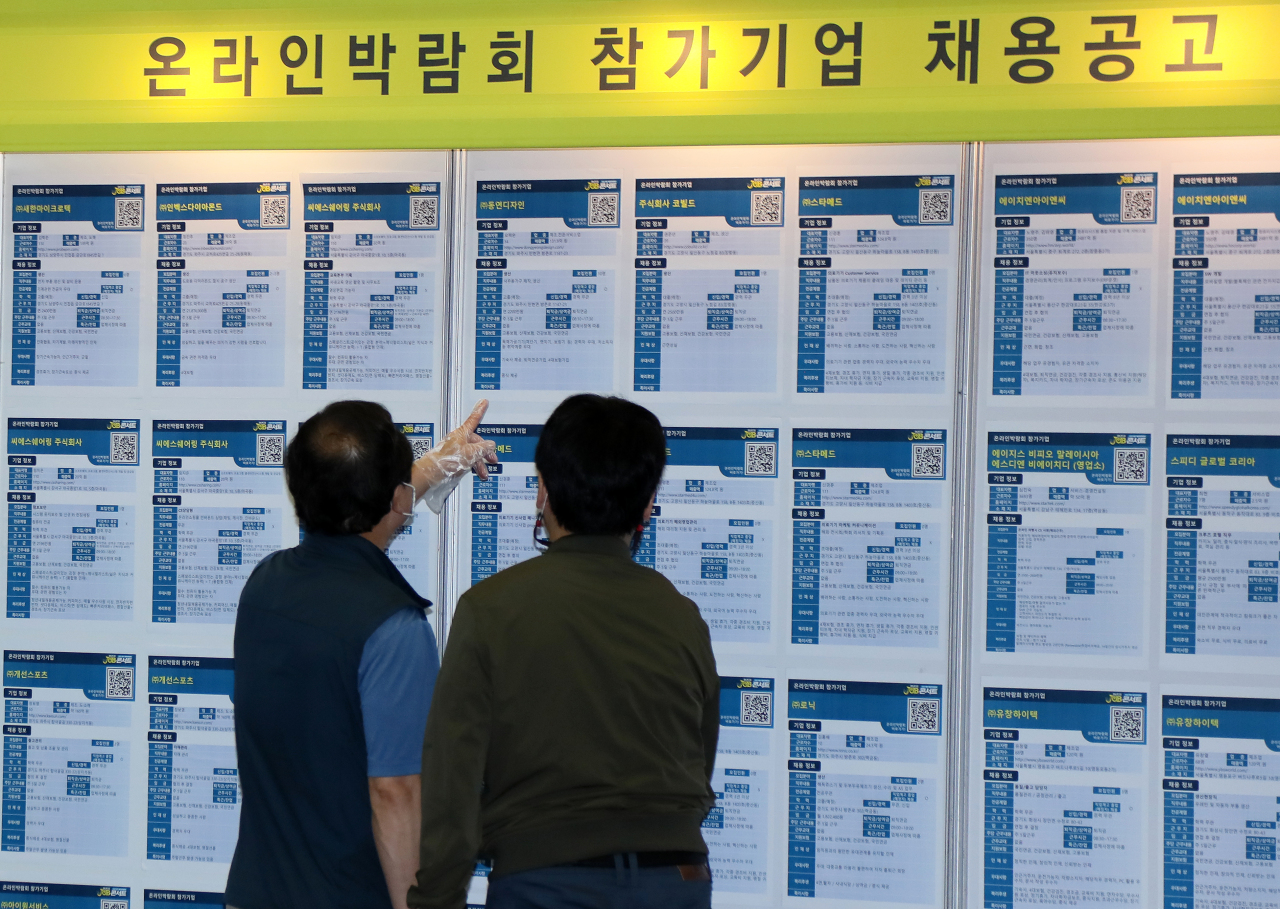Irregular workers with college degrees hit record high: data
Despite economic figures signaling labor market recovery, virus-hit job seekers struggle to find quality jobs
By Choi Jae-heePublished : Nov. 1, 2021 - 15:42

South Korea saw its number of “non-regular” workers with four-year college degrees grow to an all-time high in August, data showed Monday, sparking concerns about the quality of jobs being created.
According to data from Statistics Korea, the number of workers holding degrees from four-year colleges but employed on temporary or part-time contracts stood at 2.84 million, up 320,000, or 12.7 percent from a year earlier. It marked the highest since the agency started to compile such data in 2003.
The portion of non-regular employees who have college degrees increased 1.2 percentage points on-year to 35.2 percent of the total 8.06 million irregular workers in the same month. By gender, women accounted for 56.7 percent.
The government data indicated that the nation’s labor market, hit hard by the prolonged COVID-19 pandemic, has reduced good-quality job opportunities for educated Koreans, especially those in their 20s and 30s.
The number of irregular workers in their 20s and 30s came in at 2.43 million, as of August, taking up 30.1 percent of the total, followed by those aged 60 and over (29.8 percent), 50-something workers (20.7 percent) and 40-something workers (17.6 percent).
The government, however, has lauded its policy efforts for the labor market recovery given that the number of employed people reached 27.68 million in September, 671,000 more than a year earlier, the largest job additions since March 2014, according to the statistics agency.
“We have made bold responses by swiftly switching to an emergency economic rescue mode. Employment, the slowest indicator to recover, was also restored to 99.8 percent of its pre-crisis level last month,” President Moon Jae-in said in a budget speech at the National Assembly, held last week.
Despite the superficial rise in the total number of jobs, experts say the country’s actual employment conditions have worsened as the government’s job creation efforts are centered on the public sector.
“The latest recovery in the hiring market was largely driven the state-led program on short-term jobs and demand for health care services amid rapid aging. As major companies reduced their hiring of new employees, a growing number of young job seekers resorted to becoming irregular workers with low pay and less job security,” said Shin Se-don, an economics professor at Sookmyung Women’s University.
“The government’s job creation projects failed to trigger the private sector to follow suit and hire more. Policymakers should speed up deregulation to prompt private companies to create more jobs, particularly in service sectors. It is basically the role of companies to offer quality jobs.”
According to data from Statistics Korea, the number of workers holding degrees from four-year colleges but employed on temporary or part-time contracts stood at 2.84 million, up 320,000, or 12.7 percent from a year earlier. It marked the highest since the agency started to compile such data in 2003.
The portion of non-regular employees who have college degrees increased 1.2 percentage points on-year to 35.2 percent of the total 8.06 million irregular workers in the same month. By gender, women accounted for 56.7 percent.
The government data indicated that the nation’s labor market, hit hard by the prolonged COVID-19 pandemic, has reduced good-quality job opportunities for educated Koreans, especially those in their 20s and 30s.
The number of irregular workers in their 20s and 30s came in at 2.43 million, as of August, taking up 30.1 percent of the total, followed by those aged 60 and over (29.8 percent), 50-something workers (20.7 percent) and 40-something workers (17.6 percent).
The government, however, has lauded its policy efforts for the labor market recovery given that the number of employed people reached 27.68 million in September, 671,000 more than a year earlier, the largest job additions since March 2014, according to the statistics agency.
“We have made bold responses by swiftly switching to an emergency economic rescue mode. Employment, the slowest indicator to recover, was also restored to 99.8 percent of its pre-crisis level last month,” President Moon Jae-in said in a budget speech at the National Assembly, held last week.
Despite the superficial rise in the total number of jobs, experts say the country’s actual employment conditions have worsened as the government’s job creation efforts are centered on the public sector.
“The latest recovery in the hiring market was largely driven the state-led program on short-term jobs and demand for health care services amid rapid aging. As major companies reduced their hiring of new employees, a growing number of young job seekers resorted to becoming irregular workers with low pay and less job security,” said Shin Se-don, an economics professor at Sookmyung Women’s University.
“The government’s job creation projects failed to trigger the private sector to follow suit and hire more. Policymakers should speed up deregulation to prompt private companies to create more jobs, particularly in service sectors. It is basically the role of companies to offer quality jobs.”



















![[Today’s K-pop] Treasure to publish magazine for debut anniversary](http://res.heraldm.com/phpwas/restmb_idxmake.php?idx=642&simg=/content/image/2024/07/26/20240726050551_0.jpg&u=)